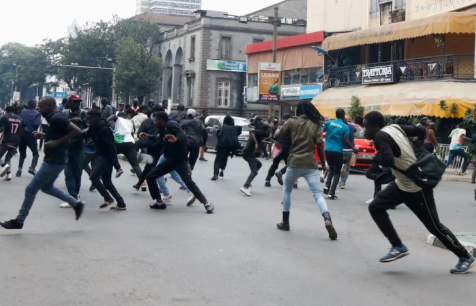Kenyan activists have called for renewed protests on Tuesday, rejecting President William Ruto’s appeals for dialogue after he withdrew proposed tax hikes. Last week, clashes between protesters and police resulted in at least 24 deaths, with parliament briefly stormed and set ablaze.
Initially sparked by a finance bill intended to raise 346 billion Kenyan shillings ($2.69 billion) in taxes, the protests—led by young people and largely organized on social media—have since expanded to include demands to root out corruption and calls for Ruto to step down. This has escalated into the most serious crisis of Ruto’s two-year presidency.
In a Sunday evening interview with Kenyan television networks, Ruto mainly defended the actions of the police and his government, which seemingly hardened the protesters’ resolve. On Monday, activists circulated pamphlets on social media, urging people to occupy Nairobi’s Central Business District under the hashtag #OccupyCBDTuesday.
Despite the lack of official leadership within the protest movement, tens of thousands participated last week in some of the largest demonstrations in recent memory. Activists are now discussing in social media audio forums how to maintain momentum, even after achieving the immediate goal of stopping the finance bill.
SPENDING CUTS
In his interview on Sunday, Ruto reiterated his previous calls for dialogue with young people. He said he was prepared to do this in a forum of their choosing, including the X Spaces where they often gather to discuss issues and strategise.
Many protesters reject the calls for dialogue, seeing them as an effort to co-opt the movement.
“You can’t dialogue with someone who is killing you on the other hand,” one activist said during an X Space over the weekend.
Ruto defended the conduct of the police in his interview, saying they had done the best they could under the circumstances and blaming “criminals” who he said had hijacked peaceful protests.
Ruto also suggested in the interview that the budget gap caused by the withdrawal of proposed tax hikes would be funded by borrowing, seemingly contradicting earlier statement that money would be saved through austerity measures.
Asked about this on Monday, Finance Minister Njuguna Ndung’u noted that there are legal limits on borrowing and the carrying capacity of debt.
“So it means that we must have expenditure cuts. This will be known once Parliament approves Supplementary one (budget),” he told Reuters in a text message.
Kenya’s national debt of more than 70% of gross domestic product already surpasses the statutory limit of 55% of GDP.
After withdrawing the bill, Ruto asked lawmakers to pass a supplementary budget, but parliament is currently in recess.
($1 = 128.5000 Kenyan shillings)


